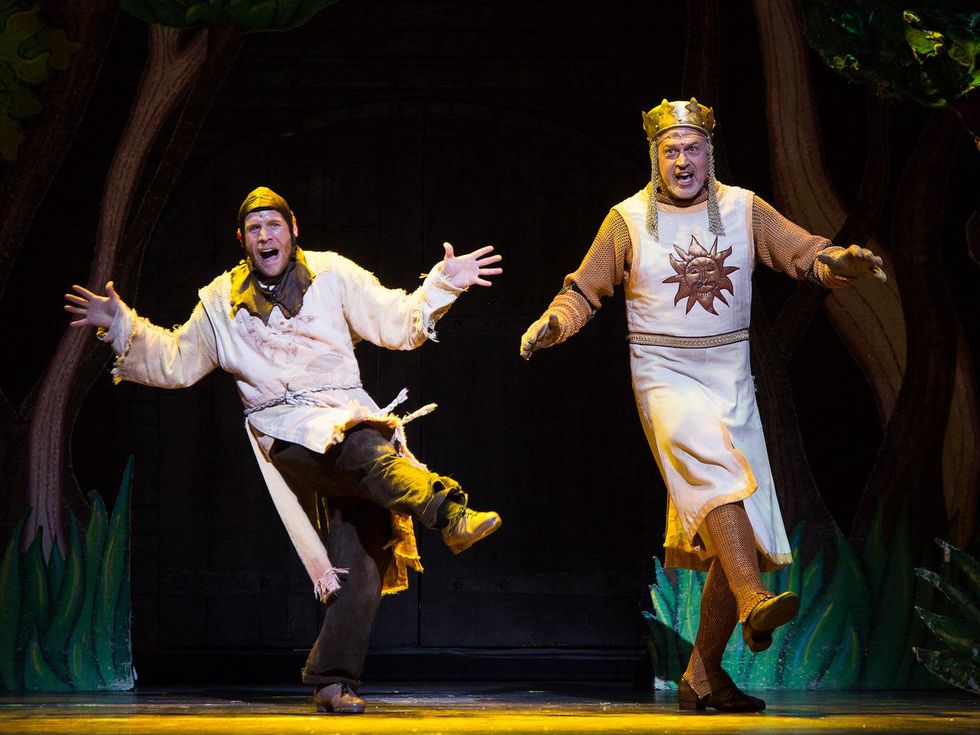Life's A Stage
Kings battle in Houston: It's Camelot vs. Spamalot, may the best Arthur win
It’s not always good to be the king, especially if that king is Arthur, King of the Britons. Sometimes he must declare war on his best friend and see his kingdom torn asunder by his own rule of law. Other times he must engage in a life or death struggle with a murderous, demon bunny.
He seldom finds his deserved happy ending, yet we can’t stop telling stories about him.
Theatre Under the Stars made the unusual choice to revive two radically different versions of Arthur’s story for Houston audiences this season — putting on the musicals Camelot and Spamalot.
Both actors Petkoff and Hewitt think of Arthur as a flawed, but ultimately very good king.
This double selection left me wondering how can one ancient king, who might not have ever existed at all, still find a fond place in our jaded imaginations? Where does the noble warrior and benevolent King Arthur, ruler of Camelot and seeker of the Holy Grail, fit in our world of royal baby bumps, royal naked-Vegas-pool-playing, and royal corgis?
Battle of the Arthurs
I decided to consult two experts for answers, the men channeling King Arthur: Robert Petkoff, who played Camelot’s Arthur in February, and Tom Hewitt who just picked up Excalibur for the Spamalot run.
Though some of the tales of Arthur, Camelot and the Knights of the Round Table are more than a thousand years old, Sir Thomas Malory in the 15th century did much to shape the legend. Chaucer, Alfred Lord Tennyson and even Mark Twain are a few of the writers who added their own spin on the characters. So why have so many poets, artists, novelist, lyricists and screenwriters gone back in time to meet Arthur and bring him into their present?
All too soon, the powerful king is bogged down in the pettiness and silliness of humanity.
Both actors Petkoff and Hewitt think of Arthur as a flawed, but ultimately very good king. Hewitt sees Spamalot’s Arthur as “earnest, righteous and on a holy quest” for the Holy Grail.
The Camelot Arthur’s quest is just as lofty, and just as unattainable, a new civil society where justice reigns, where might works for the right instead of might is right.
Petkoff notes that his version of Arthur grew up never knowing he was destined to be king.
“He was raised as a common person who is now in charge. He carries with him a common person’s sense of his place in the world, and yet as king he tries to find a way to better everyone’s lives,” he explains.
The TUTS production of Camelot proved that the play has aged well and many of its themes, and surprising bits of humor, still resonate with contemporary audiences. Yet, the musical was born in the early 1960s, and in many ways reflects that time period. Its theme of great potential and possibility lost too soon, which were already woven into the play, was made more prominent by the musical’s association with the Kennedy Presidency.
Petkoff believes when we get back to his core, Arthur will always remain poignant because the character is a kind of Celtic version of a messianic character, “someone from humble beginnings who comes out of nowhere, who has an idea to revolutionize and bring peace to the world.”
Though the great leader’s beautiful kingdom may only exist briefly, it will live on in story. This is how Camelot ends, with Arthur ensuring that the tales of the lost kingdom will live on in the imagination of a young boy, and that boy will live on to tell the tale.
A King for Our Absurd Times
Yet, when Hewitt and I talked about his portrayal of Arthur in Spamalot, I began to see how playwright and Monty Python alumni Eric Idle created a new Arthur who is also perfect for our current political climate, when cynicism makes us all the more hungry for noble quests and a visionary leader to believe in.
“[Arthur] wants to do the right thing,” Hewitt says of his character, “but that thing in Spamalot is often reduced to the sublimely ridiculous task of having to find a shrubbery so he can pass through the Knights Who Say Ni.”
Spamalot’s Arthur begins with such noble aspirations: To find honorable knights, to do good for the people, and to find the Holy Grail. Yet, all too soon, the powerful king is bogged down in the pettiness and silliness of humanity, where possible allies demand to be bribed with shrubs and where battles for honor are reduced to enemies catapulting cows at him.
“[He’s] a political leader who has to deal with the absurdity of the political system,” Hewitt says. In a way, Arthur has quite successfully joined the 21st century, becoming a politician who accurately reflects our times.
We might think the trend in contemporary media to constantly reboot the same character over and over is a product of our short-attention-span era. But long before Batman or James Bond took on a hundred different faces, there was King Arthur, and for a thousand years we’re been retelling and retooling his story, remaking that ideal but flawed leader into the perfect knight to fight for us in every age.
Spamalot runs through Sunday at the Hobby Center.
Robert Petkoff as King Athur in TUTS' production of Camelot, left, and Tom Hewitt as King Athur in Spamalot, also a TUTS production





